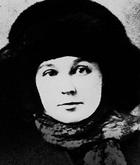
Born in Moscow (1892) fate is inextricably linked to the contemporary history of Europe, marked by two world wars and the advent of two totalitarian regimes. Married very young Sergey Ephron, left alone in Moscow with two little girls Irina, the youngest, die of starvation during the great famine winter 1919-1920- when her husband up as a volunteer of the White Army. In 1922 he left Russia and, after passing through Berlin, goes to Prague where he is reunited with her husband. In Bohemia, Marina passes one of the happiest and most crucial periods of his life, intensifies his poetry and correspondence; also lives an affair with Konstantin Rodzévich, which resulted in numerous poems, including one that is certainly one of his greatest works, Poem of the end. In 1925, the family moved to Paris, where Marina continued his literary activity. In 1938, after a period of agonizing doubts He fears for the fate of his people and his own, for the future of his son Mur and the conditions of life expectancy him back with his youngest son to Russia, where are her husband and daughter, Alia, collaborators of the Soviet government. After two months, however, Sergei Efron Alia is arrested and sent to the camps. The State then publish prohibited. The circle seems to close and life becomes a dead end. In 1941, Marina and her son are evacuated along with a group of writers to a remote Tatar village, where, in despair and sadness, committed suicide shortly after






